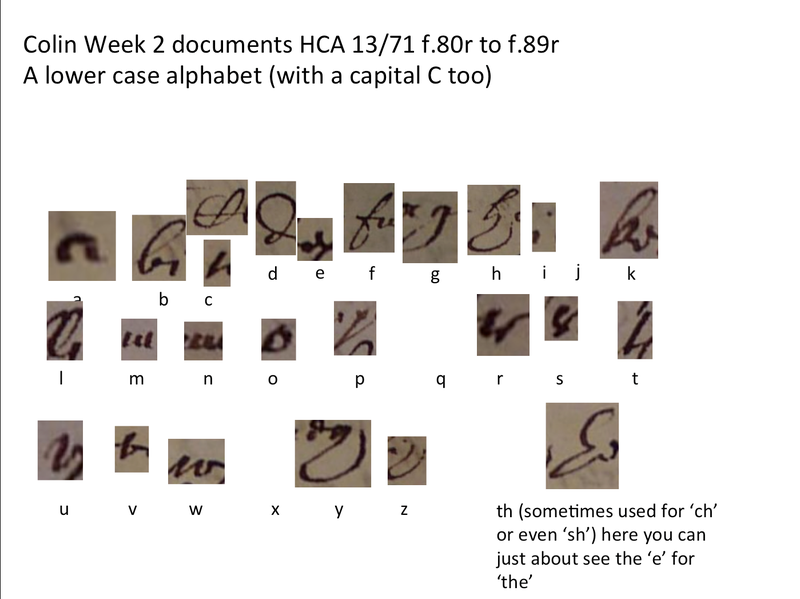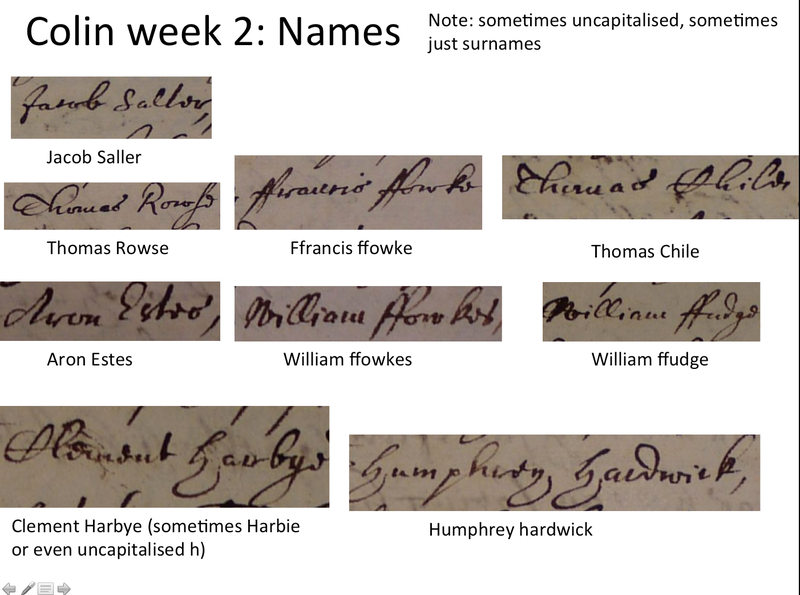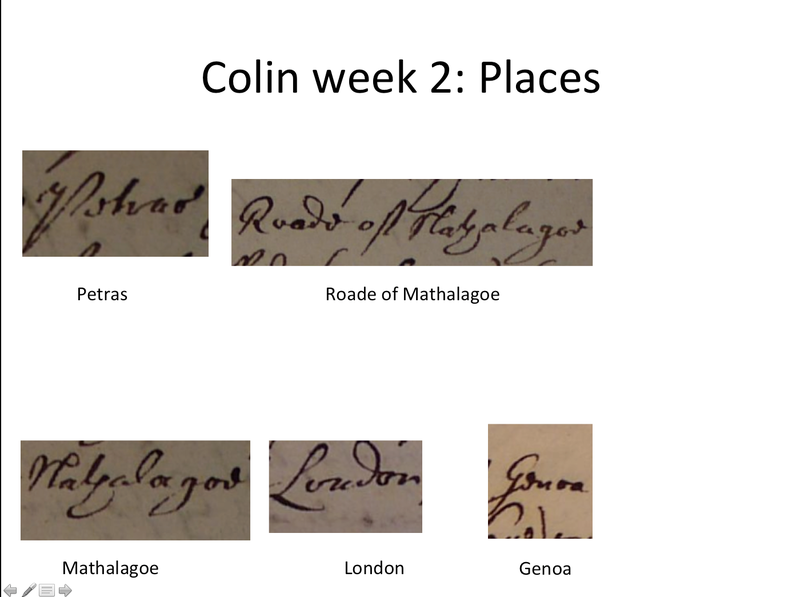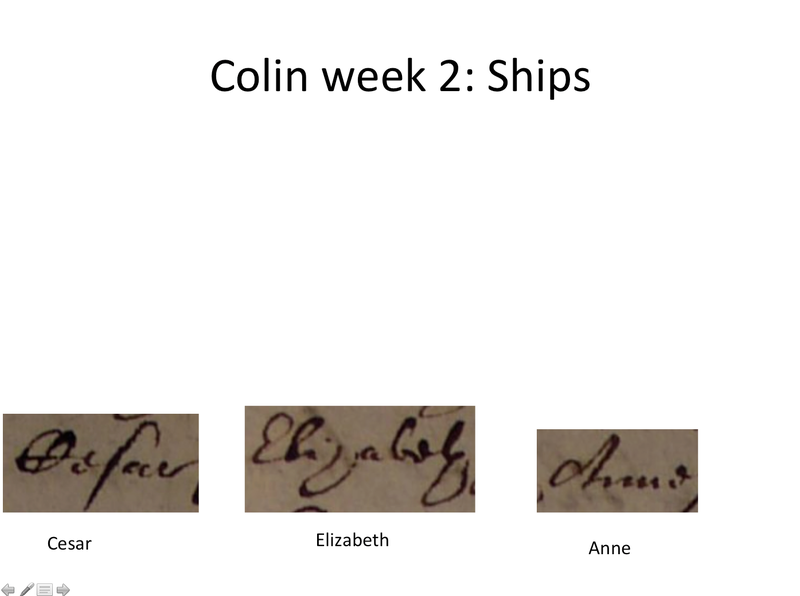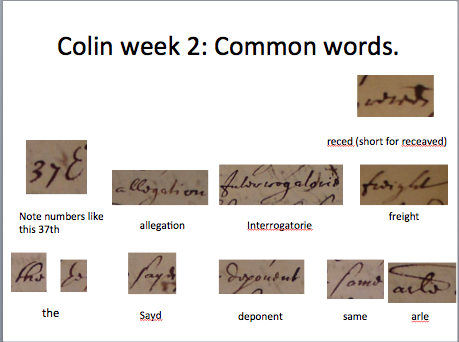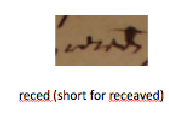Team Colin
Team Colin
Editorial history
23/08/12: CSG, created page
Contents
Suggested links
Page log
Team Jill
Team William
Team Giovanni/Patrizia
MarineLives-Transcript: Team Colin
Tasks for the week
Week commencing 20th August 2012
- 19/08/12: Uploaded four images (HCA 13/71 f.19r, f.19v, f.20r, f.21r)
- These are images for palaeography practise by all MarineLives team members
- 22/08/12: Uploaded twenty seven images (HCA 13/71 f.21v-f.34v)
- These are additional images for palaeography practise by all MarineLives team members
Week commencing 30th August 2012
Week commencing 3rd September 2012
Week commencing 10th September 2012
Notes and help for Colin week 2 HCA 13/71 f.80r to HCA 13/71 f.89r
Below you can find some slides with common names, places, ships, and words that come up in this set of documents. You can also find an alphabet made from clippings from that set of documents.
Alphabet
Names
Places
10/09/12: Mathalagoe in slide below is possibly "Nathalagoe" (Colin Greenstreet)
- Can an associate or a facilitator find it on a map and identify what the modern name is for this place?
Ships
Common Words
TIPS from Colin
Common words that may prove difficult
- Contest; precontest
- Rendent
- y:t (transcribe this as "that")
- y:m (transcribe this as "them")
Legal language
- Note that you answer to an interrogatory, but depose to the articles of an allegation (allon)
- Note that deponents are often asked whether they have an interest in the cause and whether they are otherwise concerned with the matters, to which they usually reply that they favour only the truth
- vizt
QUERIES FROM COLIN GREENSTREET
13/09/12
- Does anyone know what "dennage" means, and what the related to be "Dennys" for goods means.
- See:
19. And this Rendent did often urge the sayd Masters to be gone, and one of them
20. vizt William Shrotch sayd positively he would not till he had further order
21. from his Owners, which he pretended to expect from Dublin, and refused
22. to signe the bills of lading, pretending he was Master for the shipp, and Dennys
23. for the goods
(HCA 13/71 f.162r P1130491)
Earlier
- HCA 13/71 f.19v Completed by Colin – please would someone check
- HCA 13/71 f.21r Started by Colin - please would someone finish
- HCA 13/71 f.22v P1080930
- Line 3: "hee saith he ćannot depose"
Question: is the acute accent over the "c" or over the "a". This problem is a very frequent one on most manuscript pages
- Contrast with Line 7: "otherwise he cánnot depose." (HCA 13/71 f.24v P1080934)
- HCA 13/71 f.24r P1080933 Started by Colin - please would someone finish
- "Samuel Dun of Limehouse in the County of Midds Mariner late cheife
masters mate and Steevador on board the shipp Thomas Bonadventure
Capt Hughes Commander the voyage in question, aged 36 yeares..."
- HCA 13/71 f.24v P1080934 Started by Colin - please would someone finish
QUERIES FROM ALEX JACKSON
- 13/71 f.82r P1130365 Started by Alex - Please refer to the first line: Have I got the name 'Currans' correct? Also, can anyone work out what the word immediately infront of it is? Is it Gulyle? Is this a first name?
- COLIN: "Currans" is correct (= modern "currants": word infront of it is "Gulphe", For examples of the usage of "Currans" and "Currants" see Commodities
13/71 f.82r P1130365 Started by Alex - Also, attached to the word deposed (apparently attached) on lines 1 and 5 are what appear to be a 'p' and an 'e', but this doesn't work. Might it be 'pre'deposed? If so, could somebody explain why?
- COLIN: The word is indeed "predeposed", and means that the witness has already deposed on the matter, and is referring back to it. Clerks often ommitted the "e" in "pre", writing "prdeposed". Our editiorial convention is to expand the contracted form, inserting the missing letter in italics, as in "predeposed". For legal commercial terms in HCA documents see Legal & Commercial Terms
Started by Alex - Please refer to lines 5 and 8 on HCA 13/71 f.70v and lines 16 and 35 on HCA 13/71 f.82r. Is the place name Potrao? It continues to look like that to me, but I don't find that name in the section 'Geographical and Place Terms' so I suspect I'm reading it wrong. There is a 'Poltrao' in that section, but I can't see an 'l'. Any suggestions?
- COLIN: (1) See "Poltrao (the Road of ?Poltrao" (HCA 13/73 Part Two))" in Geographical and Place Names: P. I suspect this is the same place as your reading of "Potaro", but there are also other spellings (2) See also a SKYPE conversation I had today with Jill Wilcox, who had a similar question:
[15:20:08] jill wilcox: Hi colin there a place in the notes for colin week 2 which is transcribed as petras, do you know where this is?
[16:06:33] Colin Greenstreet: It is either Petrao or Petras, and I think it is in the area in the Greek islands called Morea, see: Early nineteenth century description of Venice to Morea and onwards trade (http://bron.wikispot.org/Zante#head-57612aa08d517d203248b1ab90c7ddd144c70a4e)
[16:07:12] Colin Greenstreet: Infact, looking at that URL, I see a place called "Petrasso" . "Currants, it has been observed, are a considerable article of export from the Morea; Petrasso is one of the best ports to ship them from; the fruit is rather larger and more free from and or gravel, than that of either Zante or Corfu. They are shipped in various sized casks, from twenty hundred weight to fifty pounds. The quantity shipped must weight above five hundred weight net, otherwise, they are liable to seizure. The casks are always included in the weight of the fruit, and paid for as such; the Morea currants have the preference in most countries, except England, where the Zante currants are more merchantable."3"
[16:10:47] jill wilcox: karen thought it might be patras which is a place in Greece, and on the coast
[16:11:43] Colin Greenstreet: That is possible. If it is mentioned in the context of currants it is likely to be Petrasso as above, but that could also be the place called Patras Karen has identified"
Started by Alex - Please refer to lines 22 and 24 on HCA 13/71 f.70v. There appear to be brackets in the text. How do I insert this punctuation?
